 English
English



-
 Afrikaans
Afrikaans -
 Albanian
Albanian -
 Amharic
Amharic -
 Arabic
Arabic -
 Armenian
Armenian -
 Azerbaijani
Azerbaijani -
 Basque
Basque -
 Belarusian
Belarusian -
 Bengali
Bengali -
 Bosnian
Bosnian -
 Bulgarian
Bulgarian -
 Catalan
Catalan -
 Cebuano
Cebuano -
 China
China -
 China (Taiwan)
China (Taiwan) -
 Corsican
Corsican -
 Croatian
Croatian -
 Czech
Czech -
 Danish
Danish -
 Dutch
Dutch -
 English
English -
 Esperanto
Esperanto -
 Estonian
Estonian -
 Finnish
Finnish -
 French
French -
 Frisian
Frisian -
 Galician
Galician -
 Georgian
Georgian -
 German
German -
 Greek
Greek -
 Gujarati
Gujarati -
 Haitian Creole
Haitian Creole -
 hausa
hausa -
 hawaiian
hawaiian -
 Hebrew
Hebrew -
 Hindi
Hindi -
 Miao
Miao -
 Hungarian
Hungarian -
 Icelandic
Icelandic -
 igbo
igbo -
 Indonesian
Indonesian -
 irish
irish -
 Italian
Italian -
 Japanese
Japanese -
 Javanese
Javanese -
 Kannada
Kannada -
 kazakh
kazakh -
 Khmer
Khmer -
 Rwandese
Rwandese -
 Korean
Korean -
 Kurdish
Kurdish -
 Kyrgyz
Kyrgyz -
 Lao
Lao -
 Latin
Latin -
 Latvian
Latvian -
 Lithuanian
Lithuanian -
 Luxembourgish
Luxembourgish -
 Macedonian
Macedonian -
 Malgashi
Malgashi -
 Malay
Malay -
 Malayalam
Malayalam -
 Maltese
Maltese -
 Maori
Maori -
 Marathi
Marathi -
 Mongolian
Mongolian -
 Myanmar
Myanmar -
 Nepali
Nepali -
 Norwegian
Norwegian -
 Norwegian
Norwegian -
 Occitan
Occitan -
 Pashto
Pashto -
 Persian
Persian -
 Polish
Polish -
 Portuguese
Portuguese -
 Punjabi
Punjabi -
 Romanian
Romanian -
 Russian
Russian -
 Samoan
Samoan -
 Scottish Gaelic
Scottish Gaelic -
 Serbian
Serbian -
 Sesotho
Sesotho -
 Shona
Shona -
 Sindhi
Sindhi -
 Sinhala
Sinhala -
 Slovak
Slovak -
 Slovenian
Slovenian -
 Somali
Somali -
 Spanish
Spanish -
 Sundanese
Sundanese -
 Swahili
Swahili -
 Swedish
Swedish -
 Tagalog
Tagalog -
 Tajik
Tajik -
 Tamil
Tamil -
 Tatar
Tatar -
 Telugu
Telugu -
 Thai
Thai -
 Turkish
Turkish -
 Turkmen
Turkmen -
 Ukrainian
Ukrainian -
 Urdu
Urdu -
 Uighur
Uighur -
 Uzbek
Uzbek -
 Vietnamese
Vietnamese -
 Welsh
Welsh -
 Bantu
Bantu -
 Yiddish
Yiddish -
 Yoruba
Yoruba -
 Zulu
Zulu
gas chromatograph
Gas chromatography (GC) is a powerful analytical technique widely used to separate and analyze compounds that can be vaporized without decomposing. It plays an essential role in various fields such as environmental monitoring, pharmaceutical development, food safety, and petrochemical analysis, among others.
The principle behind gas chromatography is relatively simple a sample is vaporized and carried by an inert gas, known as the mobile phase, through a column packed with a stationary phase. As the sample passes through the column, its components interact differently with the stationary phase, causing them to separate based on their volatilities and affinities. This separation occurs at different rates, allowing the components of the mixture to emerge from the column at different times.
The efficiency of a gas chromatograph is largely determined by the characteristics of the column. Columns can vary in length, diameter, and the type of stationary phase used. One common type of stationary phase is a polymer, which can selectively interact with specific compounds based on their chemical properties. Additionally, the temperature of the column can be programmed to enhance the separation of components. This technique, known as temperature programming, allows for better resolution of compounds with a wide range of boiling points.
gas chromatograph

Once the separated components exit the column, they are detected by a detector, which can provide quantitative and qualitative data. Common detectors used in GC include flame ionization detectors (FID), thermal conductivity detectors (TCD), and mass spectrometers (MS). The choice of detector depends on the specific application and the properties of the analytes being measured.
Gas chromatography has numerous applications. In environmental science, it is used to determine pollutants in air and water samples. In the food industry, GC is vital for detecting food additives, pesticides, and spoilage toxins. In pharmaceuticals, it ensures the purity and stability of drug compounds. Furthermore, GC is crucial in forensic science for analyzing substances such as drugs or explosives.
In summary, gas chromatography is an indispensable tool in modern analytical chemistry, offering speed, efficiency, and accuracy in the separation and analysis of complex mixtures. Its versatility makes it a go-to method for scientists across multiple disciplines, shaping the way we understand and evaluate chemical substances.
-
Testing Equipment Industry Sees Major Advancements in 2025: Smart & Precision Technologies Lead the WayNewsJun.06,2025
-
Applications of Direct Current Generators in Renewable Energy SystemsNewsJun.05,2025
-
Hipot Tester Calibration and Accuracy GuidelinesNewsJun.05,2025
-
Digital Circuit Breaker Analyzer Features and BenefitsNewsJun.05,2025
-
Benefits of Real-Time Power Quality Monitoring Devices for Industrial EfficiencyNewsJun.05,2025
-
Earth Fault Loop Testing in High-Rise Building Electrical SystemsNewsJun.05,2025



